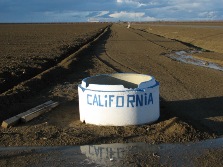
This morning’s news for Central Valley farmers was bad–but not unexpected: record low allocations of water from state and federal irrigation systems, just as growers make their spring planting decisions.
There are two major plumbing systems that supply water for Valley farms. This morning, the federal Bureau of Reclamation said the best-case scenario will be that ag customers of its Central Valley Project get 10% of their requested water this year. Zero is more likely for most, especially if the current season’s weather patterns persist. The previous low for CVP allocations was 25% in the early 1990s.
Also today, the California Department of Water Resources confirmed its earlier estimate of 15% allocations for farms served by the State Water Project.
The recent string of rainy days has left fields soggy but failed to make a dent in the current drought. Elissa Lynn, Senior Meteorologist for the state Department of Water Resources says we’d need four or five more big storms by April to bring the state’s precipitation levels up to normal.
It’s unlikely it will keep raining hard enough, for long enough, to bring California out of a drought.
And that means more fighting over the state’s water supply. Especially when it comes to the massive state and federal plumbing projects that pipe water from northern California to make arid Central Valley fields bloom.
Not only is there less water in the state’s reservoirs, but there are restrictions on pumping it because of legal decisions to protect the endangered delta smelt.
On The California Report this morning, we visited with a Fresno County tomato farmer, to find out how he’s coping. If you missed it, that radio story will be posted here sometime today.
For more on the drought, explore Climate Watch’s newest resource, California’s Water. Visit this page for access to KQED’s drought coverage, data and reports from the Department of Water Resources and the National Oceanic and Atmospheric Administration, and California water news from across the Web.
2 thoughts on “Record-Low Water Allocations for Farms”
Comments are closed.

There was a very striking quote in your piece: “They handed out water rights like they were handing out Wall St. bonuses”. I don’t think that’s quite right though. Bonuses are a distribution of actual earnings – whether its a fair distribution or not. Water rights are more like a line of credit – which offers the promise of being able to borrow more into the future, whether the bank has money or not.
Of course, unlimited promises of a ‘right’ to water make no more sense than unlimited promises of credit. And, like the financial crisis, the water crisis is going to impose some discipline on us whether we like it or not.
Note that we’ve updated this post with this morning’s allocation numbers.